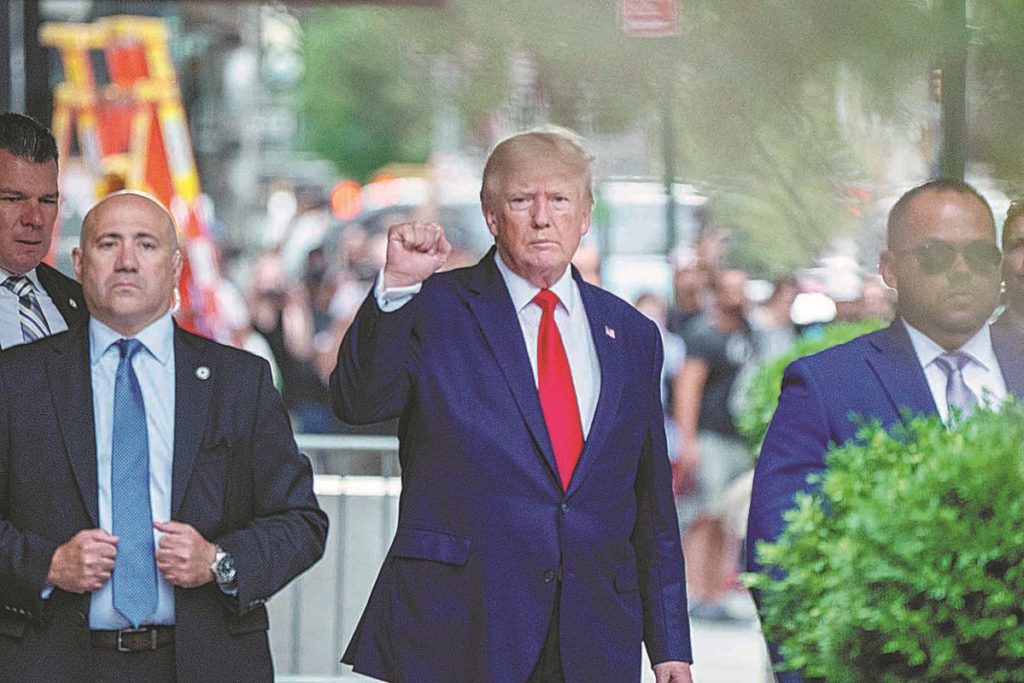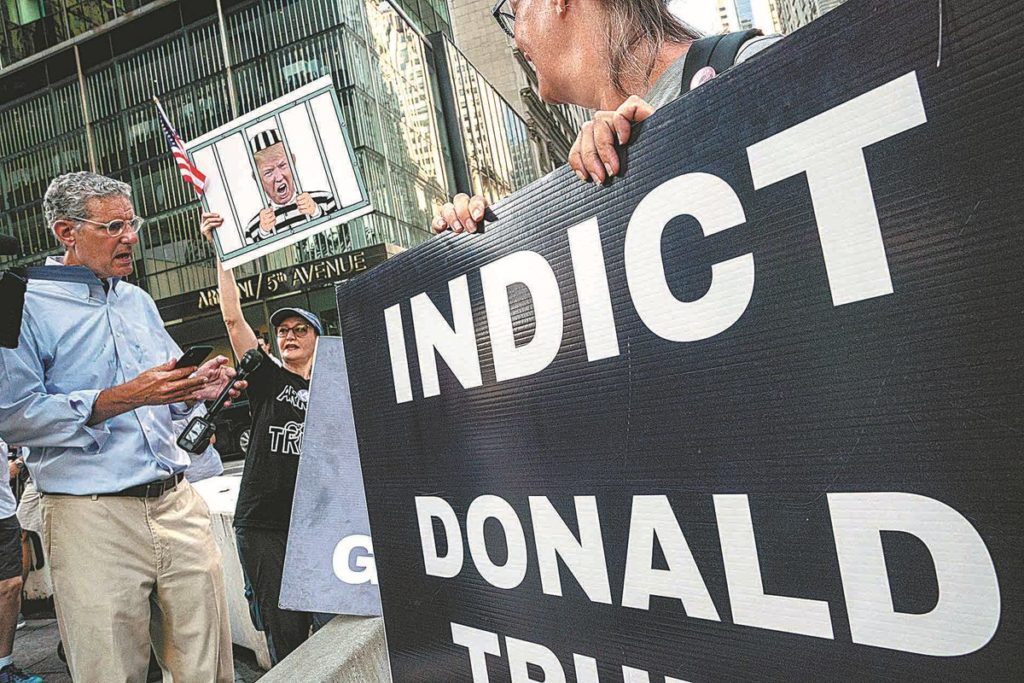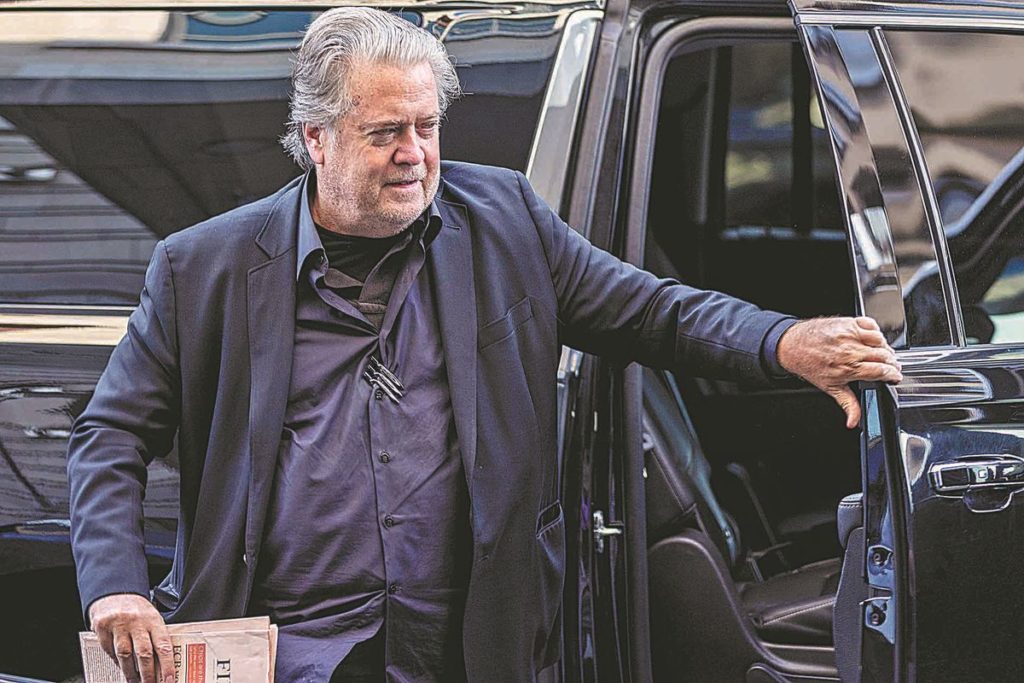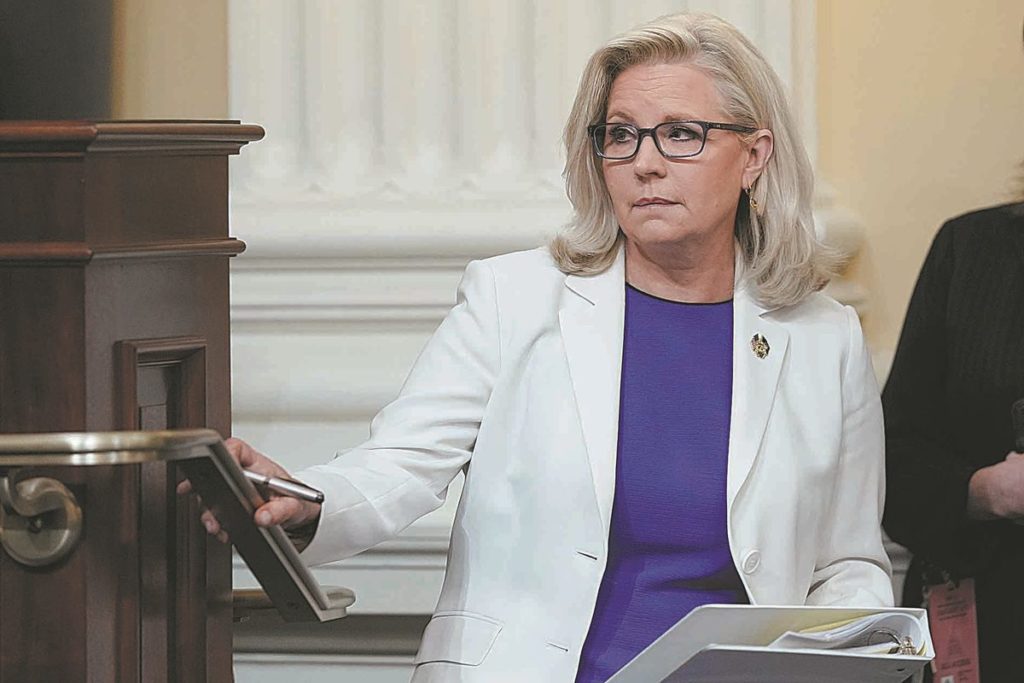Criminal referral of Trump key issue for committee
As September approaches and millions in the United States near the end of their summer break, the nine members of the House Select Committee are preparing for season two of their investigation into the attack on the Capitol on Jan 6 last year.
Over the course of eight publicly televised meetings that started in June and ended on July 21, the panel presented evidence and selective video clips of depositions from witnesses as it has sought to prove President Donald Trump’s culpability for the attack.
So far, the panel has presented a detailed narrative, including several bombshell revelations, of efforts by Trump and his allies to overturn the 2020 election. The committee has built a case that is more political than legal that Trump is not fit to hold the office.
It has alleged that Trump knew he lost the election but pressured officials to overturn the result anyway.
The panel also alleged that Trump called supporters to Washington and incited them to march on the Capitol, knowing that some were armed.
The committee has revealed that Trump then watched the mayhem unfold for 187 minutes on television alone in the White House and did nothing to stop it.
The panel comprises mostly Democrats. It includes two of Trump’s fiercest Republican opponents-Wyoming Representative Liz Cheney, who is vice-chair of the committee, and Illinois Representative Adam Kinzinger, who has announced he will not seek re-election next year.
The hearings are not a criminal proceeding. There has been no cross-examination of witnesses. The committee has no power to file charges. Its goal from the very first hearing has been less legal and more political.
Beyond some of the bombshell revelations presented by witnesses, the hearings have been effective by using a highly produced, made-for-television format against the former TV celebrity who made it to the White House as the 45th president.
The hearings drew an average of 13.1 million viewers, according to the Nielsen TV ratings service. Some 20 million watched the first televised hearing on June 9. Congressional Republicans have boycotted the hearings and tried to cast doubt on their legitimacy. After the second hearing, Trump issued a 12-page rebuttal to testimony and evidence presented by the committee, accusing Democrats of seeking to distract from a series of domestic issues facing the country.
“Seventeen months after the events of January 6, Democrats are unable to offer solutions,” Trump said on June 14. “They are desperate to change the narrative of a failing nation, without even making mention of the havoc and death caused by the Radical Left just months earlier. Make no mistake, they control the government. They own this disaster. They are hoping that these hearings will somehow alter their failing prospects.”
A key question the committee will have to answer is whether its final report will include a criminal referral of Trump. The report is expected to be produced in the fall as the nation heads into midterm elections.
Many Democrats argue the evidence presented by the committee against Trump is now so damning that the Justice Department should charge him with obstruction of justice, criminally defrauding the US, and possibly seditious conspiracy, and they believe it is up to Attorney General Merrick Garland to pursue further. But then Garland might indict Trump based on the Justice Department’s current investigation.
With the nation already bitterly divided following the Supreme Court’s denial of a constitutional right to an abortion by overturning Roe v. Wade on May 24, would such a prosecution of the ex-president cause so much recrimination that it might be counter to the national interest?
Garland has been silent on what, if anything, he may do, telling reporters recently: “No person is above the law in this country. There is nothing in the principles of prosecution …which prevent us from investigating anyone who is criminally responsible for an attempt to undo a democratic election.”
Representative Bennie Thompson, the Mississippi Democrat who is the panel’s chairman, said, “There needs to be accountability, accountability under the law, accountability to the American people, accountability at every level.
“If there is no accountability for Jan 6, for every part of this scheme, I fear that we will not overcome the ongoing threat to our democracy. There must be stiff consequences for those responsible.”

‘Unfit for office’
Vice-Chair Liz Cheney, a Republican from Wyoming, said in a CNN interview on July 24, “There’s no doubt in my mind that the (former) president of the United States is unfit for further office.
“Any man or woman who would conduct themselves the way that he did in attempting to overturn an election and stay in power must never again be anywhere close to the Oval Office.”
The 56-year-old daughter of former vice-president Dick Cheney was stripped of her House leadership position because of her defiance of Trump. She is expected to lose to a Trump-backed primary challenger next month, who will then win the state’s only House seat in November.
Cheney has said she has no regrets about her opposition to Trump.
“If I have to choose between maintaining a seat in the House of Representatives or protecting the constitutional republic and ensuring the American people know the truth about Donald Trump, I am going to choose the Constitution and the truth every day,” she said.
During its summer recess, the committee has continued to question potential witnesses behind closed doors, including some Trump allies and former office holders.
Lara Brown, director of the George Washington University Graduate School of Political Management, said, “You have that sense that we are seeing only a small portion of sort of the proverbial tip of the iceberg.”
Committee members said the eight public hearings so far have led new witnesses to come forward with documents, videos and information that need to be examined before proceedings continue next month.
California Representative Zoe Lofgren, a Democrat, said: “We have considerably more to do. We have far more evidence to share with the American people, and more to gather.”
The committee is still fighting at least two dozen cases in federal court over access to testimony or phone records. The most prominent case is that of former Trump adviser Stephen Bannon.
He refused to comply with a subpoena to appear before the panel or produce documents. He was found guilty on July 22 by a grand jury of two counts of contempt of Congress. Each count carries a minimum of 30 days and a maximum of one year in prison, as well as a fine of $100 to $100,000. Bannon is due to be sentenced on Oct 21.
The committee is also seeking testimony from former White House chief of staff Mark Meadows. He initially handed over some text messages and documents to the committee, but refused to cooperate further or give a deposition, claiming Trump had asserted executive privilege. The House held him in contempt of Congress, but the Justice Department has decided not to pursue charges.
Meadows is challenging in court the validity of the committee’s subpoenas for his documents, testimony and phone records. A federal judge is considering whether a former president can assert privilege over a former aide.
At the committee’s final hearing last month, Cheney said: “In the course of these hearings we have received new evidence, and new witnesses have bravely stepped forward. Efforts to litigate and overcome immunity and executive privilege claims have been successful, and those continue. Doors have opened, new subpoenas have been issued, and the dam has begun to break.”
Cheney has said the committee could “contemplate a subpoena” for Virginia “Ginni” Thomas, a conservative activist and wife of Supreme Court Justice Clarence Thomas, if she does not voluntarily meet with the committee over her role in advocating to overturn the 2020 election results.

Heated exchange
Trump’s former deputy White House chief of staff Tony Ornato, who works for the Secret Service, Trump’s former Secret Service lead agent Robert Engel, and the driver of Trump’s vehicle on Jan 6 have all retained private counsel to engage with the committee. The three were said to have been involved in a heated exchange with Trump when he was told he could not go to the Capitol after his rally at the Ellipse, near the White House, on Jan 6.
The panel also is expected to delve into how Secret Service text messages from Jan 5 and Jan 6 were deleted after congressional committees instructed the agency to retain all records that might be relevant to the attack. The Department of Homeland Security’s inspector general has launched a criminal investigation into the destruction of those communications.
The committee has yet to publicly examine how the nation’s security forces failed to anticipate a coordinated strike on the Capitol. The resolution passed by the House creating the select committee to investigate the riot specifically tasked the panel with answering that question and making recommendations to prevent such violence in the future.
The Jan 6 attack was the worst on the Capitol since British soldiers burned it in 1814. The Jan 6 attack came from within the country, not from outside. Five people died. Lawmakers were rushed to safety as the certification of a presidential election gave way to violent insurrection. Gallows were erected for vice-president Mike Pence.
Roughly 330 defendants accused of storming the Capitol still await trial on felony charges. About 70 people have pleaded guilty and nine have been convicted at trial. A former police officer from Virginia who stormed the Capitol was sentenced to more than seven years in federal prison on Aug 11, equaling another Jan 6 defendant for the longest sentence to date.
Cheney opened the final summer hearing by noting the progress the committee has made, but she added that there is now new evidence and more witnesses to consider.
Committee Chairman Thompson told reporters recently, “We’re just getting a significant amount of information”, adding the new evidence “pushes the timetable out”.
He said the committee could issue an initial report next month, followed by a final report later this year. The findings would be accompanied by hearings, he said.
The most sensational testimony of the hearings to date came from Cassidy Hutchinson during the panel’s sixth session. The 26-year-old was an aide to Meadows, Trump’s final chief of staff.
She told the panel on June 28 that Trump knew the crowd was armed, but he wanted to loosen security. “They’re not here to hurt me,” she testified that Trump said as he demanded that security checkpoints be removed outside his rally on the Ellipse on Jan 6.
Cassidy also described Meadows as being disengaged and unwilling to act as rioters moved toward the Capitol.
“Are you watching the TV, chief?” Hutchinson recalled asking Meadows. “The rioters are getting really close. Have you talked to the president?” “No,” she said he responded, Trump “wants to be alone right now.”
Another aide to Meadows, Ben Williamson, said in testimony to the House committee that “any suggestion he didn’t care is ludicrous”.
Hutchinson also recalled being told of an irate Trump trying to grab the wheel of his vehicle from a Secret Service agent when he was told he couldn’t go to the Capitol to join his supporters. Trump quickly denied it and the Secret Service officials said it would be rebutted in forthcoming testimony.

Plate accusation
Trump’s anger had become so uncontrollable in the weeks after the 2020 election that when he was told in December that Attorney General William Barr had said publicly that there was no widespread election fraud, Trump threw a plate of lunch at a wall in a White House dining room, shattering the plate and leaving ketchup dripping down the wall, Hutchinson testified.
Trump denied this, saying: “Never. Never. Not my thing. And I never did it anywhere else, either.”
The day after Hutchinson testified, Trump and his allies rounded on her.
“The lies and fabricated stories being told to the partisan Highly Unselect Committee, not only by the phony social climber who got caught yesterday, but by many others, are a disgrace to our, in serious decline, Nation,” Trump wrote the next morning on his social media platform.
At the end of Hutchinson’s two-hour testimony, Cheney hinted at yet another potential area of liability, suggesting that Trump and his allies could be engaging to tamper with witnesses and obstruct the committee’s work.
Despite the gripping testimony given by Hutchinson and others during the hearings, the latest Monmouth University Poll released on Tuesday suggests that the hearings have not moved opinion among the US public.
Patrick Murray, director of the independent Monmouth University Polling Institute, said, “The sensational revelations during the hearings do not seem to have moved the public opinion needle on Trump’s culpability for either the riot or his spurious election fraud claims.”

The poll showed that 38 percent of the public thought Trump was directly responsible for what happened on Jan 6. Another 26 percent said Trump was not directly responsible, but he encouraged those involved, and 32 percent said Trump did nothing wrong regarding Jan 6. Just 5 percent of Republicans said Trump was directly responsible and 23 percent said he encouraged those involved.
When asked how to describe the incident at the Capitol building, 64 percent said “riot” was appropriate, 52 percent said “insurrection” was appropriate, while 35 percent said it was appropriate to call it a legitimate protest.
Moreover, 29 percent of US citizens-including six in 10 Republicans-continue to believe Joe Biden only won the 2020 presidential election due to voter fraud-unchanged from the June poll. These results are also similar to a Monmouth poll taken last year before the committee was formed.
The poll found that 41 percent of US citizens-including 73 percent of Democrats-favor charging Trump with crimes related to his involvement in the Jan 6 attack, while 34 percent are opposed-including 66 percent of Republicans. Another 25 percent are unsure.
The public was divided on whether having Trump stand trial would help (31 percent) or hurt (35 percent) the stability of the nation’s political system, while another 30 percent said this would have no impact on the country overall.
Murray said: “When we released our June poll, I said the committee was preaching to the choir. These current results suggest they haven’t recruited any new singers since then.”



